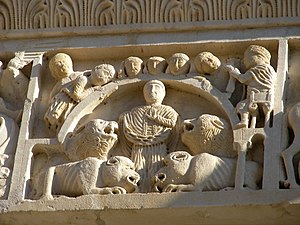Saint Cerbonius
| Saint Cerbonius | |
|---|---|

Saint Cerbonius and the wild beasts, Massa Marittima Cathedral
|
|
| Born |
c. 493 AD North Africa |
| Died | 575 AD Elba |
| Venerated in | Roman Catholic Church, Eastern Orthodox Church |
| Feast | October 10 |
| Attributes | geese; bear licking his feet |
| Patronage | Massa Marittima |
Saint Cerbonius (Cerbo, Italian: San Cerbone, San Cerbonio) (d. 575 AD) was a bishop of Populonia during the Barbarian invasions. Saint Gregory the Great praises him in Book XI of his Dialogues.
An alternate tradition made him a bishop of Massa Marittima around 544 AD, and devotion to the saint in this city arose after Massa Marittima became an episcopal center.
Another tradition states that Cerbonius was a native of North Africa who was the son of Christian parents. He was ordained a priest by Saint Regulus (San Regolo), though not the same one as in the Scottish Legend. Due to persecution by the Arian Vandals in North Africa, the local Christian community dispersed, and together with Regulus, Felix, and some priests, Cerbonius escaped to Italy. After a storm at sea, they landed at Tuscany, where they lived as hermits. During the war raging currently in Italy between Byzantine and Gothic forces, Regulus was imprisoned and decapitated by the Goths after being accused of aiding the Byzantines.
After the death of the bishop of Populonia, Florentius (Fiorenzo), the citizens and clerics asked that Cerbonius serve as their bishop. The citizens soon became frustrated with him, however, since Cerbonius rose every Sunday at daybreak and said mass instead of doing so at the normal hour. The people complained to Pope Vigilius. Vigilius, on hearing what the saint had done, became angry and sent legates to Piombino to bring the bishop to Rome. They found Cerbonius eating breakfast and accused him of heresy, believing that he was eating before performing mass, when in fact he had already performed the service.
...
Wikipedia
